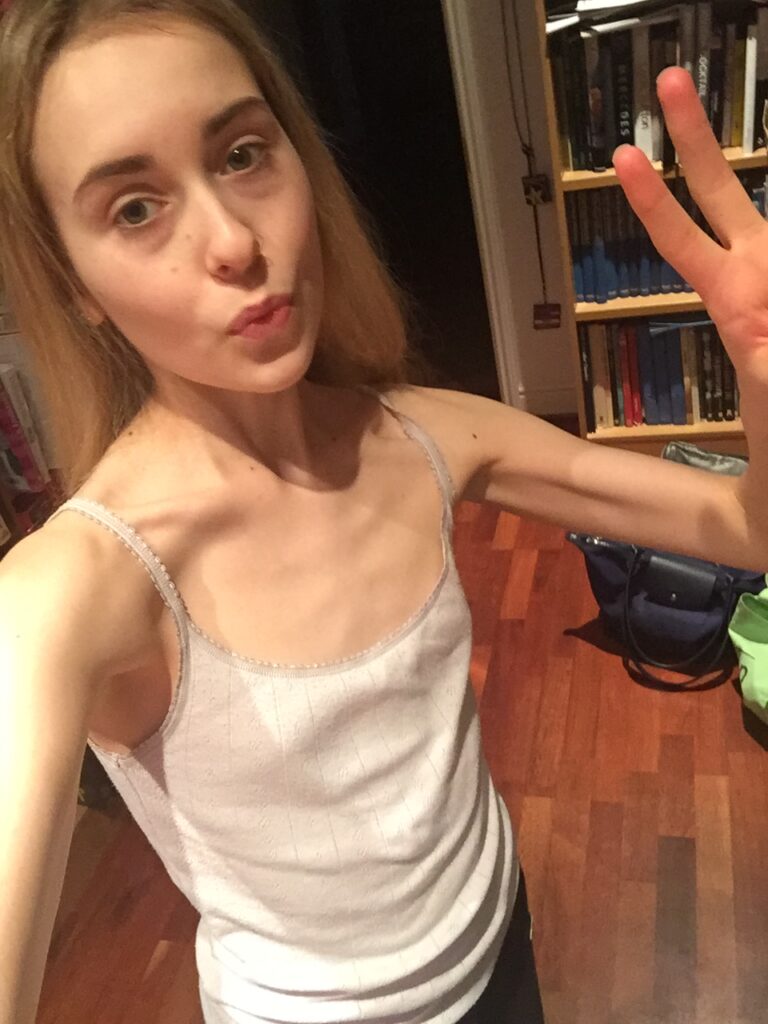TRIGGER WARNING.
Text mentions eating disorders, depression.
As EDAW comes around, I always get anxious about whether to be involved in the conversation or not. The anxiety stems from fear that if I partake in it I will be judged for having an eating disorder. The other anxiety surrounds the fact it’s very shameful to admit you have or have suffered from an eating disorder. The symbiosis of shame and judgment, therefore, make me want to shy away and keep it to myself. Yet, I scroll through my social media and see numerous posts about individuals’ experiences knowing too well that I have a story to tell. And that my story is just as valid as anyone else’s. So, I do want to spread awareness and show that eating disorders are real and whether you believe you went through a “phase” of it or have suffered from one for nine years, it deserves attention.
If you have followed me for a while, you might know that I have battled an eating disorder since the age of twelve. Or at least, that is when I pinpoint the start of my real eating disorder thoughts. I was actually only diagnosed with it by a GP (general practitioner) until I was thirteen by which point I was ticking every box on the “Anorexia nervosa: symptoms” page on the NHS website. To which I replied: “Yeah but don’t you have to be skeleton thin to have anorexia”? And there goes the misconception that is continually thrown around when it comes to anorexia: that you have to look a particular way to “have it” (whatever that translates to).
You do not have to be underweight to have anorexia. Period.
Too often anorexia is conceived of as a physical illness. It’s the “oh, she must be anorexic, have you seen how thin she is!”. Yes, repeated restrictive eating (calorie deficit) causes weight loss, but that is not the entirety of what anorexia is; otherwise, a lot of people would be classified as having anorexia if that’s all it was. Anorexia is not a diet. Anorexia is not a phase. Anorexia is not glamourous. Anorexia is an umbrella term for an extremely complex disorder. A disorder that kills one in five that do not recover. If I can do anything to raise awareness, it is to emphasize how shockingly difficult it is to suffer from an eating disorder, and even worse, how underfunded this sector of the NHS is.
It’s a complex mental illness. So complex that a mere blog post won’t be able to tell you what it is. I ask myself all the time what would have happened if I had been diagnosed that bit sooner. It is beside the point to factor in the timeline of when I was diagnosed. What is important, however, is why it took me so long to be recognized by a mental health service to get help. It took me the best part of seven months before it was recognized that I was suffering from an eating disorder. It led to an emergency intervention which I did not welcome as a thirteen-year-old, in complete denial. Fast forward a year, I reached my goal weight and was informed that I was likely to be discharged from the mental health service. That meant no more weekly weigh-ins, monthly blood tests, ECG’s and blood pressure monitored. In terms of the emotional impact that meant no more dedicated spaces each week to discuss how I was doing in terms of my eating disorder. What happens when you have anorexia and reach your 95% target weight is that the service deems you no longer a medical necessity, therefore, a waste of their time. I had not received any therapeutic help for my thoughts. I asked for ways to cope when I was struggling with my thoughts and was told this would happen when I was at a healthy weight. I reached a healthy weight and was told that people needed the service more than me. Individuals were more physically at risk than me and so I was no longer a priority to the service. I started to see my mental health team every other week.
Unfortunately, that was all it took for me to slip under the radar, and unsurprisingly, I relapsed pretty hard. So hard that a few months later I am pulled out of school having collapsed two weeks prior. The mental health team told my Mum I needed to be in a wheelchair and on nutritional supplements. I refused and carried on as I was. Next came the paramedic having to visit home from my body turning completely blue. I then had to wait for a month-long gap before a bed was offered to me for a specialist inpatient service. By the time I was admitted, I was on death’s door. I cannot begin to imagine how my family must have felt: seeing their daughter closer to death every single day and still not able to receive specialist help due to the bed shortages in the UK. Me? Nothing scared me at that point. Wasn’t reality waking up and wanting to go back to bed? Perhaps being a mere 15, surrounded by strangers miles from home, and threatened with being tube-fed might have made me clock the impact of what I was doing to myself.

After going inpatient, a lot of people with eating disorders describe their willpower to never want to go back. In general terms, it leads to a lot of eating disorder sufferers giving their all to recovery. I, on the other hand, relapsed as soon as I could. I had been allowed to discharge myself from mental health services because I was deemed a healthy weight after leaving the inpatient unit. Of course, that was anorexia’s cunning plan all along. Gain the weight, get everyone off my case, and then lose it all again. A year later, my physical health was teetering in the same place it had been before I was admitted. Mentally, things had catapulted: anxiety, depression, self-harm – the ugly triad. I was soon being threatened with being institutionalized if I did not try and get better.

However, my family would not let that happen without fighting. My Mum decided to invest in private therapy for me to see if I would engage. It was as if a fog was being lifted. I was actually given the space to engage in a therapeutic setting, not violently torn away from it because of where my BMI lay. Since when did your weight determine whether you deserved treatment?

The fact that doctors are only obliged to spend 2 hours on eating disorder training does not surprise me. I still go to doctor’s appointments today and am asked whether I eat. I’ve been told I look “too thin” by a doctor even when I have been in a considerably “good place” with food. Nuance does not seem to go hand in hand when treating eating disorders. The stigma for individuals with eating disorders is undeniably prevalent and saddening. How about “How are you coping?”, “How are things for you”, “Are you ok”. Such statements could have made a world of difference to me when I was having a bad day.
I am tired of the recovery narrative: you gain weight, the thoughts go away and you are cured. This is not what recovery is. It’s a constant, continuous journey. A fight, a struggle that only those who have gone through an eating disorder will ever understand. I want to use my voice in every way possible to raise awareness for a mental illness so tragically misunderstood. It’s perhaps insufficient of me to expect to ever articulate how strongly I feel about this topic – but I will try. Eating disorders can be a living hell for both the sufferer, parents, siblings, friends and loved ones – you should not have to battle it on your own.

For so long I believed that my anorexia was my only identity. I would only say that in the last year, if that, I’ve begun to realize that there is more to me than anorexia. That is not to suggest I am recovered – I do not think it is as simple as that. Yet, I take risks now. I chase my dreams and goals continuously. My impulse to live far outweighs that to self-destruct. I am not that person anymore. I am on my own journey that I am so proud of. I have worked tirelessly to be here. I will not throw the towel in as I know all too well how much it took to find my own inner strength. That takes guts. To completely abandon the thing that felt the most real to you. I have gone through more than most 21-year-olds have had to go through, but that is my story, that is my narrative. It is far from over yet.
